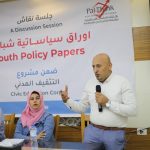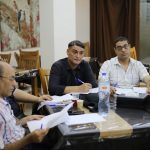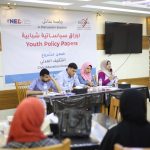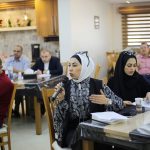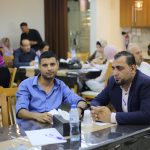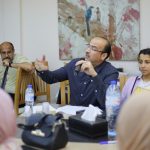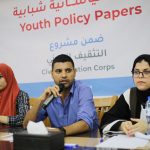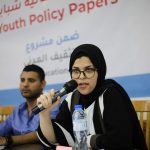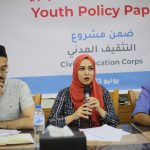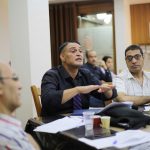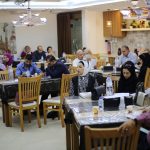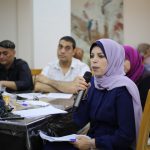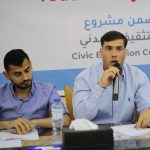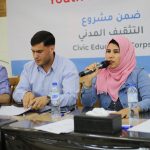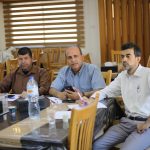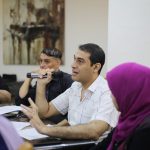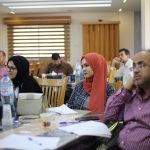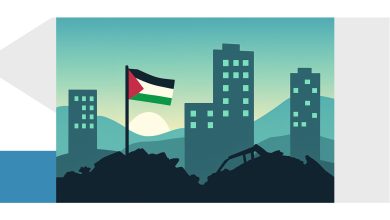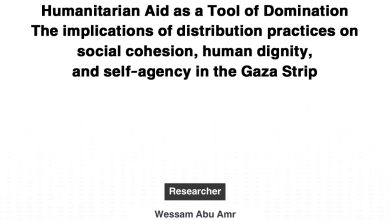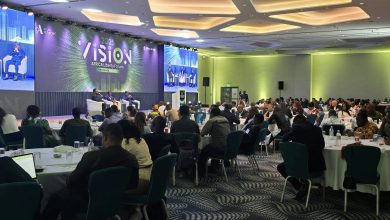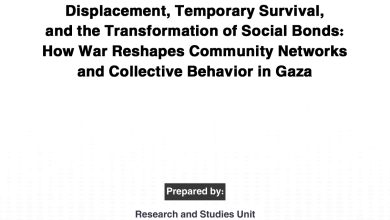“Youth Policy Papers” Papers produced by Pal-Think’s Civic Education Corps

Pal-Think has carried out a session to discuss the five policy papers authored by members of the Civic Education Corps project that is funded by the National Endowment for Democracy (NED). This aims at improving youth research and policy writing skills to contribute to the development of Palestinian society through employing these skills in addressing its contemporary issues.
In the presence of a number of elite intellectuals, researchers and civil society representatives, Sally Alsammak, the project coordinator, opened the session by welcoming the attendees and said:” the participants have exerted their time and efforts to produce such papers based on their realistic perspectives and daily suffering. To expand, this was after concluding tens of awareness sessions about policy papers relevant topics in various civil society organizations with the aim of raising awareness in the society.
Ahmed Abu Salah, a member of the civic education corps, moderated the first part of the session. He started by allowing Zenab Elastal, one of civic educators to review the paper “Means to Promote Youth’s Political Participation after Postponing the Palestinian Elections”. Elastal clarified that youths are politically marginalized despite of the fact that they constitute 22% of the Palestinian population according to PCSA in 2020. She also noted that the Palestinian division and the absence of elections are the root causes impeding youth’s political participation however, holding elections and advocacy campaigns will eventually provide youth with genuine opportunities to political participation.
The second paper entitled “Palestinians’ Freedom of Movement between the International law and the Israeli Occupation”, was presented by Osama Naem, a member of the civic education corps. In his turn he stated that the freedom of movement is an essential right guaranteed in the universal declaration of human rights and the international covenant of political and civil rights. He then mentioned the Israeli occupation procedures, such as turning Palestinian crossings into checkpoints, imposing siege over the Gaza Strip for 15 years, building an apartheid wall isolating the Gaza strip.
The second part of the session was moderated by Hadeel Ahel, a member of the civic education corps. She introduced the member; Saeed Dhaik, to review the summary of his paper entitled “Towards Effective Policies to Promote Women’s Rights in the Gaza Strip”. He said that the political division has increased the vulnerability of women – who constitute 49% of Palestinian society – to social and economic insecurity and violence. With limited employment opportunities, women are forced to join the informal workforce; this made them vulnerable to several forms of exploitation, most notably economic.
Dhahik recommended several policies in this regard: At the political level, by applying a 30% quota for women in all Palestinian institutions and unions. At the economic level, by setting development plans that contribute to the integration of women, providing small and micro projects for women, Following up on the situation of women in the labour market, and changing misconceptions about women’s work. On the social level, strengthening women in society and fighting patriarchal culture.
The researcher Jomanah Abo Singer covered the paper” the Mechanisms of Promoting Students’ Participation in Community Work”. She commenced by stating that a lot of youths are oblivious of the community work and the civil society institutions and this comes as a result of the harsh economic situation and the high rate of unemployment.
She concluded by proposing mechanisms to promote community work in universities, such as the effective networking between universities and civil society institutions to engage youth in community participation, and amending the strategic plans of the civil society institutions to support community work.
Mr. Shaqoura, a member of the civic education corps, covered the paper entitled “Increasing the Minimum Wage for Workers in Gaza between Recognition and Application”. He clarified that the minimum wage in Palestine was changed twice in the past few years, and according to the council of ministers’ latest decision: the minimum wage is 1880 shekels. He also mentioned that the unemployment rate in Gaza strip is 47% and 16% in the west bank.
Mr. Sami recommended to alleviate taxation, encourage national industry, develop a national plan to promote the conditions of workers in Gaza and to enrich investment plans.


